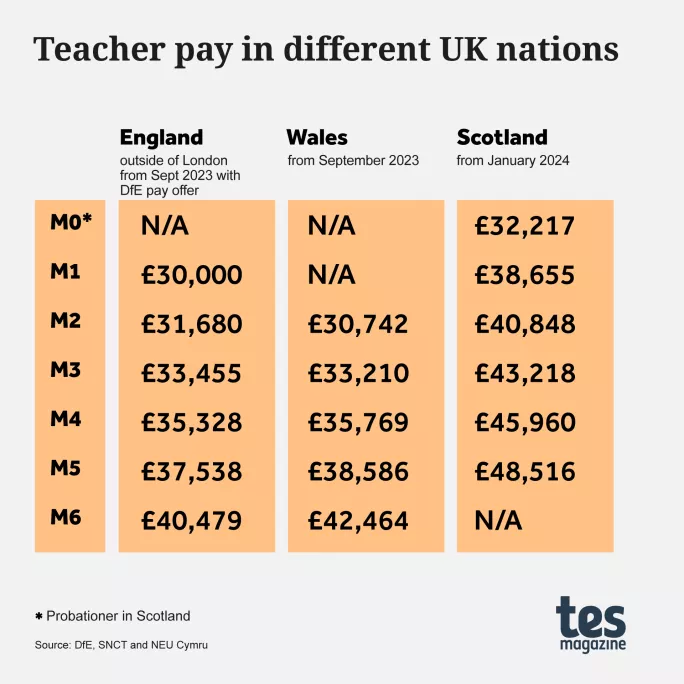Level up pay across UK or lose teachers, DfE warned

“Complacency” over pay and accountability pressures will spark a teacher drain from England to Wales and Scotland, school leaders are warning.
Heads in Northumberland, Cumberland and Cheshire have told Tes they fear a growing pay gap between England, Scotland and Wales will worsen teacher recruitment and retention in English schools that fall within commuting distance of the other two nations.
They also warn that school inspections in Wales and Scotland are seen as “more collegiate”, and therefore more appealing to teachers.
- Pay offer: Reject ‘insulting’ pay offer, NEU urges members
- NAHT: Heads to consider industrial action in response to pay deal
- NEU: We don’t want to disrupt exams
The concerns come after teachers in England were offered a deal last week that would widen the average pay gap between them and colleagues in Wales and Scotland.
While pay structures between the three nations differ, those on the M5 bracket in England next year would be more than £10,000 worse off than their colleagues in Scotland, and more than £1,000 worse off than Welsh teachers, under the government’s proposed deal.

Geoff Barton, general secretary of the Association of School and College Leaders (ASCL), said that when the situation was raised with the government in Westminster, it was met with a “dismissive” response.
But Tracy Hush, headteacher at Berwick Academy in Northumberland, just a 15-minute drive from the Scottish border, said a growing pay gap was going to have a “significant impact on recruitment and retention for schools on the border”.
She said: “It is not just about pay, it’s about accountability as well - and that’s perceptions of Ofsted. I’ve already had two members of staff approach me to say that they are looking at Scotland, and the reason cited is they can earn more money for less responsibility and less accountability than they do in England.
“The pay situation is exacerbating this. I have staff from South Shields and Washington but also from Scotland, and what’s keeping them here?”
Simon Kidwell, the headteacher at Hartford Manor Primary School and Nursery in Cheshire, said he was concerned about teachers being attracted over the Welsh border: “It’s something that people are talking about in staffrooms and picking up on.”
He continued: “[The growing pay disparity] will encourage people to look over the border, whereas before, if they were in the English system, they were in the English system. If these differentials continue to grow, we’ll see more teachers look for work in other countries.
“When I speak to Welsh colleagues, they talk about Estyn [the Welsh inspectorate] being more collegiate and more working in partnership. I hear that from the leaders.”
Sudhi Pathak, chief operating officer at the Eden Academy Trust of special schools, said that around 5 per cent of staff who worked in the trust’s Carlisle setting commuted from Scotland.
He said that it would take staff only half an hour to travel from the school into Scotland. While pay disparities had not created recruitment difficulties yet, it “may well change going forward if pay differentials continue to increase”, he warned.
‘The clear pay difference is not going to ease the situation’
Clem Coady, the headteacher at Stoneraise School in Carlisle, added that the pay gap with Scotland would “add to both recruitment and retention issues this side of the border”.
“With more leadership vacancies in Cumbria over the past 12 months compared to previous years, it shows retaining staff and, crucially, recruiting new leaders is already extremely challenging,” he said.
While “accountability and work-based pressures” were also a concern, “the clear pay difference is not going to ease the situation”, he added.
Mr Barton said ASCL was aware of concerns over how teacher recruitment and retention may be affected by disparities between pay and conditions in England compared with Scotland and Wales.
He added: “We have raised this issue with the government in Westminster, pointing out the importance of maintaining parity over pay and conditions with other UK nations, but the response we received was dismissive and complacent. Ministers do not seem to appreciate the scale of the recruitment and retention crisis.”
Members of the NEU teaching union in England yesterday rejected an offer from the government of a 4.5 per cent pay rise from September and a £1,000 one-off payment this year. ASCL followed suit this morning.
In Scotland, a pay offer accepted last month means most teachers will get a 14.6 per cent pay increase by January 2024, though this is not directly comparable to the English offer as it accumulates in three stages over the course of 28 months, starting from a backdated 7 per cent pay increase for 2022-23.
In Wales, union members last month voted in favour of a pay offer amounting to an 11.8 per cent rise for all teachers (comprising 6.5 per cent this year, followed by 5 per cent next year) plus a 1.5 per cent non-consolidated payment this year.
Ofsted - the school inspection watchdog - has come under increased scrutiny in England recently, with the NAHT school leaders’ union writing to chief inspector Amanda Spielman last month demanding inspections be suspended “while steps are taken to address the risk to the mental health of school staff”.
Education unions made calls for inspections to be paused earlier in March following the death of headteacher Ruth Perry, but Ms Spielman said that a temporary halt to school visits would be against the best interests of pupils.
And data from last month showed that secondary school job vacancies in England have soared to their highest levels for at least six years.
The Department for Education has been contacted for comment.
Register with Tes and you can read two free articles every month plus you'll have access to our range of award-winning newsletters.
Keep reading with our special offer!
You’ve reached your limit of free articles this month.
- Unlimited access to all Tes magazine content
- Save your favourite articles and gift them to your colleagues
- Exclusive subscriber-only stories
- Over 200,000 archived articles
- Unlimited access to all Tes magazine content
- Save your favourite articles and gift them to your colleagues
- Exclusive subscriber-only stories
- Over 200,000 archived articles
topics in this article



